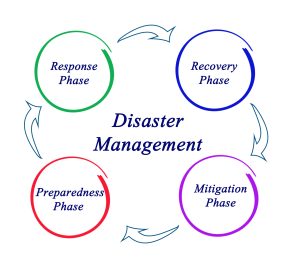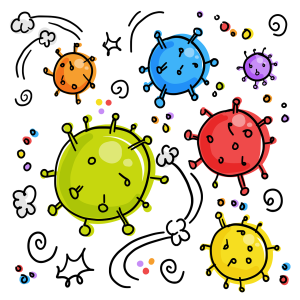4.3 Disaster & Communicable Disease Management
The Role of Nurses in Disaster Management
Nurses are crucial in disaster management, spanning various stages of the disaster lifecycle – from prevention and preparedness to response and recovery. (Firouzkouhi et al., 2021) Their responsibilities in disaster management include the following: (National Academies of Sciences, Engineering, & Medicine, 2021)

- Preparedness
- Mitigation
- Response
- Recovery
- Health Promotion and Disease Prevention
- Capacity Building and Training
- Continuity of Care
Family Nurse Practitioners (FNPs) play significant roles in all phases of disaster management. FNPs are essential in disaster management, combining clinical expertise with a holistic approach to care Table 4.3.1 outlines key aspects of their role.(AANP, 2022) (National Academies of Sciences, Engineering, & Medicine, 2021)
Nurse educators play a crucial role in disaster management, contributing to preparedness, response, and recovery efforts. Nurse educators play a vital role in preparing the next generation of nurses to effectively respond to emergencies and safeguard public health. Table 4.3.1 outlines key aspects of their role. (Rafferty-Semon et al., 2017) (National Academies of Sciences, Engineering, & Medicine, 2021)
Nurse leaders play critical roles in disaster management, extending beyond direct patient care. Table 4.3.1 outlines key aspects of their role (AONL, 2019) (National Academies of Sciences, Engineering, & Medicine, 2021)
4.3.1 Advanced Practice Nurse Roles in Disaster Management
Click on role to see detail
The Role of Nurses in Communicable Disease Management

Nurses are crucial in communicable disease management, their roles vary between settings and populations. Focus of communicable disease management is on prevention as well as mitigation.(National Academies of Sciences, Engineering, & Medicine, 2021)
Family Nurse Practitioners (FNPs) Family Nurse Practitioners (FNPs) play essential roles in communicable disease management (AANP, 2022). FNPs contribute significantly to preventing, managing, and educating patients about communicable diseases. Table 4.3.2 outlines key aspects of their role.
Nurse Educators Nurse educators play essential roles in communicable disease management. Nurse educators contribute significantly to preventing and managing communicable diseases through education, advocacy, and collaboration. (Rafferty-Semon et al., 2017) Table 4.3.2 outlines key aspects of their role.
Nurse Leaders play critical roles in communicable disease management. Nurse leaders are essential in effectively managing communicable disease crises. .(AONL, 2019) Table 4.3.2 outlines key aspects of their role.
4.3.2 Advanced Practice Nurse Roles in Communicable Disease Management
Click on role to see detail

